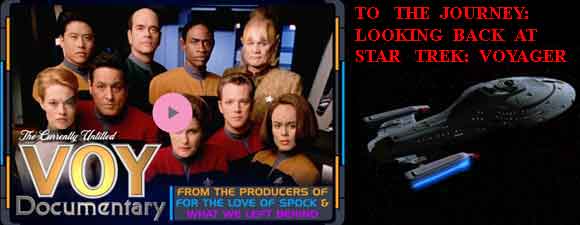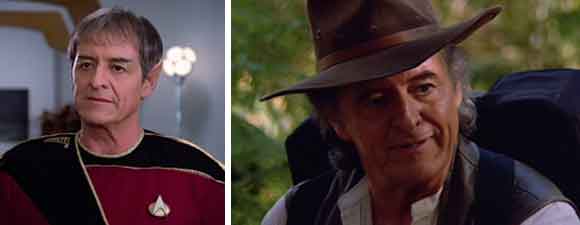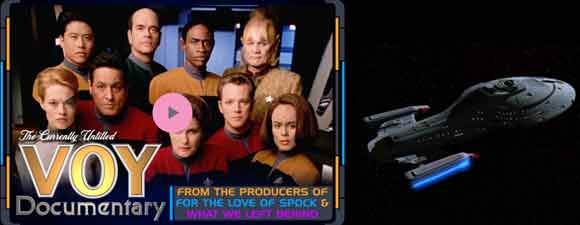Retro Review: Death Wish
7 min read
deathwishbanner
Janeway holds an asylum hearing for a Q imprisoned for eternity to prevent him from committing suicide.
Plot Summary: When Voyager encounters an asteroid that defies natural law, Torres tries to beam a sample aboard and discovers a Q imprisoned within it. This Q reveals that the Continuum imprisoned him for attempting to end his own life. When the troublemaker Q known to Picard appears to recapture the renegade, the latter asks for asylum, choosing Tuvok as his advocate. At the hearing, Q summons witnesses from various generations of humans to demonstrate the importance of the other Q’s life, explaining that not only did the suicidal Q drop the apple on the head of Sir Isaac Newton, but saved Will Riker’s ancestor so Riker could later save humanity from the Borg. Q argues that the other Q must be unstable, knowing that his death will send the Q Continuum into a state of upheaval that might disrupt the entire galaxy. Tuvok and the Q who wishes to die argue that an individual is entitled to basic freedoms, including the right to end a tedious, pointless existence. This Q takes Janeway to a representation of the Q Continuum characterized as a changeless stop on a desert road that always leads back to the same dull outpost. Janeway sympathizes with the bored, suicidal Q, but troublemaker Q tells her that she can’t understand what may be at stake, promises to send Voyager home if she rules in his favor, and sneaks into her bed to offer her a good time. Though tempted by the offer to get her crew home if not by the offer of a fling, Janeway decides that the prisoner Q must be allowed to choose his own destiny, at which point he becomes mortal. Now renamed Quinn, the ex-Q is given quarters on Voyager and a chance to explore the universe. Instead Quinn chooses to drink hemlock provided by Q, who says he now understands that the Continuum desperately needs to evolve. He also promises Janeway that they will meet again.
Analysis: Reactions among viewers of “Death Wish” vary widely, from those offended by the seeming endorsement of suicide to those who find the subject topical and sensitively handled, from those who adore seeing Q in the Delta Quadrant to those who find that twist predictable and gimmicky. I admit that I’m of a double mind. I appreciate the attempt to wrestle with a difficult issue, though I’m really not a fan of the resolution, and I enjoy seeing Mulgrew and de Lancie banter, but I’m really not comfortable with the misogynistic taunting in nearly every scene. It’s not that I object to Q appearing in Janeway’s bed, considering that he did the same thing to his adored Picard. It’s the way he points out her gender constantly, as if he expects her to react like it’s a sore point, and more than once, she does. This is particularly grating now that we know in sequel episodes, Q will adopt the outrageously sexist attitude that Janeway should give him a child, and the female Q will react like a stereotypical spurned human woman. We know Janeway can ignore leering at her backside and remarks about how she’s angry when she’s beautiful, but insinuations about women drivers should be too anachronistic to make sense to her. I’m not sure whether a Q can switch genders any more than I’m sure whether a Time Lord can switch genders, but if Q(uinn) really needs a challenge to give him a reason to live, he might try becoming a woman in the supposedly enlightened 24th century. When Q(uinn) accidentally makes all male crewmembers disappear during a botched attempt to take himself out of existence, Q makes a joke about being on a ship of the Valkyries, where perhaps human women have finally done away with the need for menfolk…an anxiety one senses many of the show’s writers have about male usefulness on a series with a female captain and engineer, not an issue anyone would expect to afflict 24th century men.
Before anyone dismisses this problem as feminist griping, it’s worth thinking about the ways defining Janeway as a woman captain, instead of just as a captain, undercuts this show’s engagement with other contemporary issues. Q is always scornful to Picard about human behavior – our warlike tendencies, our interference in conflicts that aren’t our business – subjects that trouble Picard on a philosophical level, inspiring speeches about what makes humanity worthwhile. When I try to imagine the storyline of “Death Wish” on The Next Generation, the debates are about the difficulty of defending individual rights in the face of any given person’s self-destructive tendencies…whether and when the needs of the one outweigh the needs of the many, to borrow one of Star Trek’s profound dilemmas. That debate gets about ten seconds of lip service on Voyager, buried behind repeated remarks about how wonderful it is that Janeway can be a captain yet retain her femininity. The implication is either that Q finds Janeway’s gender to be a weak point in an absolute sense or that he believes she thinks it’s a weakness; otherwise he wouldn’t keep needling on that subject. Even taking his words at face value, assuming he’s just hot for her, the fact that Q is obsessed with it, keeping them all from more important matters, can serve as an argument against having women in leadership positions, since it’s the same reason given by religions that force women to stay out of sight. If Chakotay and Paris stopped working to leer every time Janeway impressed them, the ship would never get home. To his credit, Chakotay seems much less interested in Janeway’s femininity than her intelligence and openness, and he’s mostly good at ignoring any personal feelings about her for the sake of both their jobs, as we saw last week in “Dreadnought.”
So much dialogue is wasted on Q’s inappropriate remarks that there’s no meaningful engagement with the topic of euthanasia – a subject on which Janeway might have sought opinions from Chakotay, with his spiritual background; Torres, who comes from a Klingon culture that espouses suicide for the debilitated; Kes, who must struggle with the opposite of immortality in that she will die long before all her colleagues; or the Doctor, who is programmed with medical information from cultures with a wide range of beliefs about when death is more appropriate than continued life. Yet I’m less bothered that the other characters are neglected than by the absence of any really satisfying discussion about the significance of Q(uinn)’s decisions. Q(uinn) argues that it’s a personal choice based on his suffering whether to live or die, but Q presents it as a problem for all of society, a selfish decision by someone who isn’t considering how his preventable death will affect thousands of others. Janeway tries to offer Q(uinn) an alternative, an unexplored mortal life, but Q(uinn) decides to die right away, an act that seems nihilistic rather than reasoned. Wouldn’t someone not depressed at least take a couple of days to consider food as a mortal or sex as a mortal? Q provides the poison, creating less of a sense that this is euthanasia but more akin to treating healthy but depressed people as a social burden; he’s not helping out of love for Q(uinn) but a desire to disrupt the Continuum. Aren’t there other ways Q could encourage Q(uinn) to do that, maybe by showing him the pleasures of life with a terminus, sort of the inverse of the time Q made Riker a Q? We all know Q won’t make good on his offer to take Voyager home because that ruins the premise of the show, but there are all sorts of things a Q and an ex-Q might do to rock the Continuum without someone needing to end his life.
In those circumstances, Q’s promise that he’ll be back sounds ominous rather than a cause for celebration, which turns out to be prophetic. As fun as it might be to see Mulgrew and de Lancie snap at each other, and as amusing as it might be to hear characters say things like “This ship will not survive the formation of the cosmos,” the humor feels frivolous and forced, leading to a bitter payoff. Once we see where the drama of “Death Wish” is going, even the expected Q ex machina comes across as inappropriate – Newton dying in prison accused of prostitute murders? The concert at Woodstock as an event with the equivalent significance of the discovery of gravity and salvation from the Borg? I suspect that the outrage from some quarters over the “anti-life” message one might infer from the episode could have been mitigated with a less lighthearted approach early on. Star Trek has tackled suicide before, in “Half a Life” and “Ethics” in particular, leading to more thoughtful analysis. It’s hard to take Q(uinn)’s death wish seriously when he’s cracking jokes; what he seems to want is change, not termination, but he doesn’t spend much time considering Janeway’s offer of just that. Maybe it’s because he’s bored out of his mind with everything and everyone, or maybe all the sexism of Q’s approach has convinced Q(uinn) that the captain is just a typical boring woman like every other, to whom it’s not worth his time to listen. In either case, it’s not a very hopeful message for Star Trek to tell viewers that a lack of entertainment and new vistas to explore is a good reason for turning off everything.







For 20 years, the thing that has bothered me the most out of this episode was Commander Riker’s commbadge. I had thought it an interesting way to look at the subject from a fairly safe approach. Then as I think about it more, why is Star Trek being safe? Who cares if the Captain is a female? Would we have gotten this approach from the female Q and Picard, just her oogling him? Or right here, why not Chakotay? Because. The story is set in 2369 but the writers were set in 1995. Perhaps with such a heavy topic, the writers and producers felt some, um, lightheartedness was needed. I can get on any aircraft in 2015 and if a female is captain, there is a remark or a look of surprise or something snappy like, “Female drivers, no survivors.” If, by 2369, females in positions of power is not an issue, why bring it up at all and deal with Q(uinn)’s issue? And it is an important issue to debate in 1995, 2015, and 2369. These advanced societies are being held back by contemporary writing and that’s kind of the point and it seems like the point was really missed. Qs’ society has no need for gender, for crying out loud, they take corporeal form so that humans can understand. So, if they cannot die and one wants to, help us to understand it, rather than giving us the same old claptrap? I do have to say that I get a great deal of enjoyment out of the idea that Voyager was tethered to a Christmas tree . . . something that they should have still known about . . . I mean, Captain Kirk went to the Science Department’s Christmas party and picked up some chippy, but that’s another show. Still, I laugh imagining Tom looking out the viewer as I place my copy of the Hallmark Voyager on my Christmas tree. A fine tree. A Starfleet tree. But I digress. Were we looking at Star Trek fatigue here? TPTB took their hands off the reigns of DS9 and we got some good TV. But Voyager was so spotty so much of the time. Still, can’t help but enjoy Q and Kathryn exchanging barbs and her giving him her patented death glare.
Death Wish is one of the top five Voy episodes for it’s interesting look inside the Continuum (“I’ve played the scarecrow”) and the creative tackling of existential angst utilizing the immortality of the Q.nnAs mentioned by others, still the episode is held down by 20th century writing with its constant drumbeat of “oh, look, a female captain!” Just shove it already! This wouldn’t and shouldn’t be an issue in the 24th century so it shouldn’t even be mentioned. So sick of contemporary writers who cannot conceive and write with what would be obvious sensibilities by the 24th century. This is why Trek really needs great writers who can conceptualize with an expansive perspective.
I have just getting $ 8765 within one month.I am connected with a business entity that outsource online jobs . I heard about it last year and I have made such great cash . It is great and I am just so happy to have that option u2026…. Look here for details …nn===>>> Visit Website in my u0420u0154ou0166u0128u0139u0114nn104
Finally i made $117/hr….It’s time to take some action and you can join it too.It is simple,dedicated and easy way to get rich.Three weeks from now you will wish you have started today….Make your christmas happy with a lot of Dollars.. u2588u2588u2593u2592u2591Fu2591Ou2591Lu2591Lu2591Ou2591Wu2591u2591Mu2591Eu2591u2592u2593u2588u2588nnu00bbu00bbu00bbu00bbu00bbu00bbu00bbu00bbu00bb Go to my Account For WEB ADDRESS where you earn DOLLARSnn81
Crazy idea: What if humans are not as perfect as we think they are in the 24th Century?
Equally worth mentioning, I think, is that at least this episode tried to give us something different (the look in the Q continuum), as well as an actual morale dilemma (ethics of suicide), whereas the subsequent Voyager Q episodes are virtually unwatchable. I can buy the continuum as a desert here; I can’t believe that Voyager’s crew can take over the Continuum and subdue creatures of infinite power by pointing a civil-war-era musket at them. For me, this is a Top 10 episode of Voyager (and lets Riker be the only Trek character to be in every incarnation of TV Trek since 1987).
Some of the best Trek episodes deal with this– the fact that no matter how far society has advanced, humans are, after all, still human. Trek not only points out the gaps between the individual and the ideal, Trek also encourages them to work to strive towards those ideals.